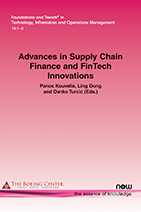Advances in Supply Chain Finance and FinTech Innovations Overview
By Panos Kouvelis, Olin Business School, Washington University in St. Louis, USA, kouvelis@wustl.edu | Ling Dong, Olin Business School, Washington University in St. Louis, USA, dong@wustl.edu | Danko Turcic, Olin Business School, Washington University in St. Louis, USA, turcic@wustl.edu
Abstract
This special volume examines three themes:
Financing Issues in Supply Chains look into popular working capital management financing practices: trade credits and guarantor practices including advanced trade credit practices in supply chains, guarantor financing practices for capital constrained retailers, and innovative practices of joint financing of capital constrained firms by a bank.
FinTech Innovations for Supply Chains examines business model innovations for supply chain financing supported through new platform technologies (such as blockchain), and simple financial technologies effectively implemented for high impact in supply chain risk management.
Advances in Risk Management of Operational Systems provide state-of-the art thinking on many risk issues in supply chain operations including disruption strategies over the product life cycle, the production planning complexities for a capital constrained manufacturer that uses Inventory Based Financing (IBF) scheme to fund its working capital needs, capacity procurement decision, capacity planning in the presence of demand and price uncertainty, and valuing complex real options in dynamic operational settings.
Emerging Advances in Supply Chain Finance and FinTech Innovations
Advances in Supply Chain Finance and FinTech Innovations examines three themes:
Financing Issues in Supply Chains look into popular working capital management financing practices: trade credits and guarantor practices including advanced trade credit practices in supply chains, guarantor financing practices for capital constrained retailers, and innovative practices of joint financing of capital constrained firms by a bank.
FinTech Innovations for Supply Chains examines business model innovations for supply chain financing supported through new platform technologies (such as blockchain), and simple financial technologies effectively implemented for high impact in supply chain risk management.
Advances in Risk Management of Operational Systems provide state-of-the art thinking on many risk issues in supply chain operations including disruption strategies over the product life cycle, the production planning complexities for a capital constrained manufacturer that uses Inventory Based Financing (IBF) scheme to fund its working capital needs, capacity procurement decision, capacity planning in the presence of demand and price uncertainty, and valuing complex real options in dynamic operational settings.

Companion
Foundations and Trends® in Technology, Information and Operations Management, Volume 14, Issue 1-2 Special Issue: Advances in Supply Chain Finance and FinTech Innovations
See the other articles that are also part of this special issue.